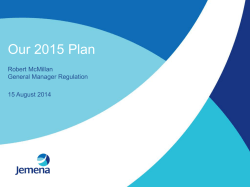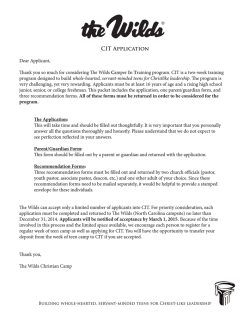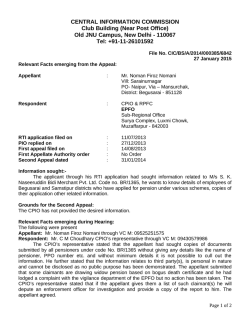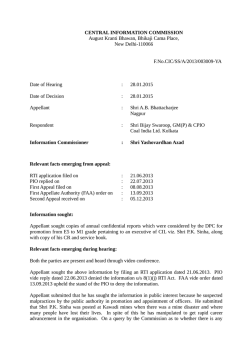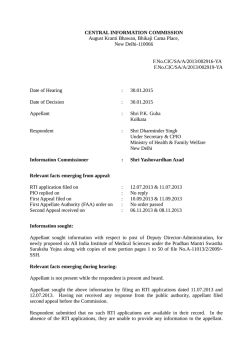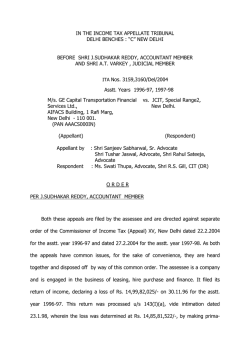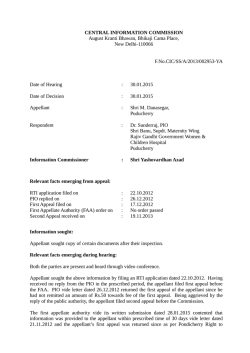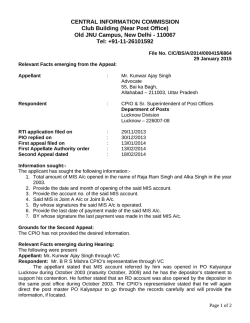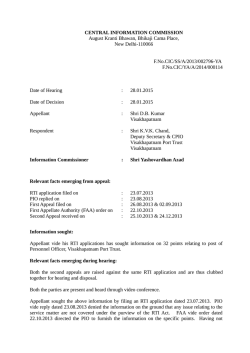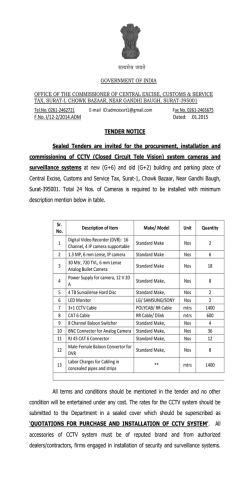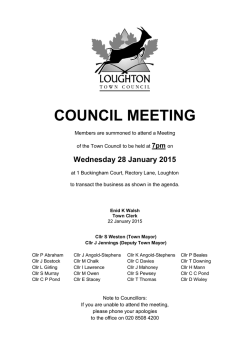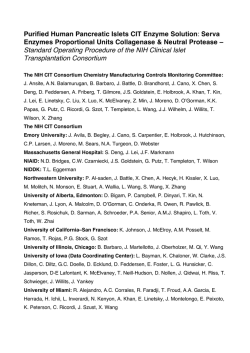
Download Full Text of the Judgment
www.taxguru.in * IN THE HIGH COURT OF DELHI AT NEW DELHI Date of Decision: September 05, 2014 + ITA No. 486/2014 & ITA No. 299/2014 COMMISSIONER OF INCOME TAX-IV Through: ..... Petitioner Mr.Kamal Sawhney, Sr.Standing Counel with Mr.Sanjay Kumar, Jr.Standing Counsel versus HOLCIM INDIA P. LTD. Through: ..... Respondent Mr.Satyen Sethi, Advocate with Mr.Arta Trana Panda, Advocate CORAM: HON’BLE MR. JUSTICE SANJIV KHANNA HON'BLE MR. JUSTICE V.KAMESWAR RAO SANJIV KHANNA, J. (Oral) 1. The following substantial question of law is proposed in these two appeals by the appellant-Revenue which pertain to the Assessment Years 2007-08 and 2008-09:“Whether the Income Tax Appellate Tribunal was right in deleting the disallowance under Section 14A of the Income Tax Act, 1961 amounting to Rs. 8,61,50,315/- in Assessment Year 2007-08 and Rs. 6,60,93,678/- in assessment year 2008-09 holding that no dividend income was earned by the assessee ignoring the provisions under Section 14A. ITA Nos. 486/2014 & 299/2014 Page 1 of 14 www.taxguru.in 2. At the outset, we notice that the Income Tax Appellate Tribunal („Tribunal‟, in short) has also examined the question whether disallowance under Section 14A of the Income Tax Act, 1961 („Act‟ in short), could have been made for the first time by the Commissioner of Income Tax (Appeals) („CIT(A)‟, in short), but, we need not issue notice on the said aspect in case we agree with the second finding recorded by the Tribunal in the impugned order dated 27.09.2013. 3. The respondent-assessee, a subsidiary of Holderind Investments Ltd., Mauritius, was formed as a holding company for making downstream investments in cement manufacturing ventures in India. In the return of income filed for the Assessment Year 2007-08, the respondent-assessee declared loss of Rs. 8.56 Crores approximately. The respondent-assessee had declared revenue receipts of Rs. 18,02,274/which included interest of Rs. 726/- from Fixed Deposit Receipts and profit on sale of fixed assets of Rs. 16,52,225/-. As against this, the respondent assessee had claimed administrative and miscellaneous expenses expenditure written off amounting to Rs. 8.75 Crores. For the Assessment Year 2008-09, the assessee had filed return declaring loss of Rs. 6.60 Crores approximately. The assessee had declared revenue receipts in the form of foreign currency fluctuation difference gain of Rs. 12,46,595/-. It had claimed expenses amounting to Rs. 7.02 Crores as ITA Nos. 486/2014 & 299/2014 Page 2 of 14 www.taxguru.in personal expenses, operating and other expenses, depreciation and financial expenses. 4. In the two assessment orders, the Assessing Officer held that the respondent-assessee had not commenced business activities as they had not undertaken any manufacturing activity or made downstream investments. The respondent-assessee, after receiving approval of Foreign Investment Promotion Board (FIPB) dated 20.12.2000 acquired shares capital of Ambuja Cement India Ltd. This, the Assessing Officer felt, was not sufficient to indicate or hold that the respondent-assessee had started their business. He accordingly disallowed the entire expenditure of Rs. 8.75 Crores for the Assessment Year 2007-08 and Rs. 7.02 Crores for the Assessment Year 2008-09. 5. The CIT(A), by two separate orders did not agree with the findings recorded by the Assessing Officer that the business of the respondent- assessee had not been set up or commenced. The CIT(A) observed that the respondent-assessee had been set up with the business objective of making investment in cement industry after due approval given by the Government of India, Ministry of Commerce and Industry vide letter dated 18.12.2002 and 20.12.2012. In fact, the respondentassessee was not to undertake any manufacturing activity themselves. He referred to the FIPB approval vide letter dated 30.03.2005 granted by ITA Nos. 486/2014 & 299/2014 Page 3 of 14 www.taxguru.in Government of India, Ministry of Finance permitting them to make investment in Ambuja Cement Ltd. by acquiring majority stake from the earlier shareholders. Thereupon, the respondent-assessee had purchased shares in the said company of Rs. 1850.91 Crores. Reference was then made to the expenditure as per the financial statement. Section 3 of the Act was elucidated upon to observe that business would be established when the assessee was ready to commence. Revenue expenditure incurred after setting up business should be allowed under Section 37 of the Act but expenditure incurred prior to setting up of business cannot be allowed. The CIT (A) accordingly held:“5.6 In view of the above discussions, I hold that the appellant is engaged in the business of holding of investment is entitled to claim expenditure provided there is a direct connection between expenditure incurred and business of the assessee company. In the instant case. the expenditure incurred is on salaries of employees of the assessee company and other operating expenses of the company. The appellant has also admitted that the said expenditure have been incurred in order to protect their investment as well as exploration of new investments”. 6. For the Assessment Year 2008-09, the same reasoning was adopted and followed. 7. However, the CIT(A) issued notice and called upon assessee, why Section 14A should not be invoked? The Section postulates that for the purpose of computing total income under Chapter IV, no deduction shall ITA Nos. 486/2014 & 299/2014 Page 4 of 14 www.taxguru.in be allowed in respect of the expenditure incurred in relation to income which does not form part of the total income. Since the business of the respondent-assessee was to act as a holding company for downstream investments and as it was an accepted fact that they had incurred expenses to protect their investments and explore new avenues of investments, the provisions of Section 14A were applicable. The exact reasoning given by the CIT(A) in this regard in respect of the Assessment Year 2007-08 is as under:“5.8....Thus, as admitted by the appellant; since business of the appellant exclusively is to act as a holding company for downstream investment in order (sic) companies and the admitted fact that they incurred the expenses to protect their investments and to explore new avenues of investments clearly show, that in the facts of the appellant's case the provision of Section 14A of the Act are clearly applicable”. [underlining is as per the original order of CIT(A)] 8. The aforesaid reasoning given by CIT(A) was ambiguous and unclear, hence, clarity was sought from the counsel for the appellantRevenue on their stand and stance. Learned senior standing counsel for the appellant-Revenue was asked to elucidate and has stated that “the stand of the assessee contained a contradiction to the extent that on the ITA Nos. 486/2014 & 299/2014 Page 5 of 14 www.taxguru.in issue of setting up of business, it was stated that the assessee had incurred expenditure on acquiring the shares, therefore, the assessee could not now take a different stand than the one taken in the first issue”. (The aforesaid submission has been recorded verbatim). 9. The said statement has left us equally confused and perplexed. Is it the Revenue‟s contention that expenditure made by investment companies should be disallowed under Section 14A of the Act as income or investment is not taxable? This is not clearly stated. We proceeded to read and examine the subsequent observations and findings of the CIT(A). 10. Thereafter, the CIT(A) has referred to the contentions of the assessee that they had not earned dividend income and therefore, Section 14A of the Act was not applicable. The CIT(A) did not agree that as no exempt income was “claimed”, no disallowance under Section 14A was warranted. The CIT(A) relied on the decision of Special Bench of the Tribunal (Delhi) in the case of Cheminvest Ltd. Vs. ITO., [2009] 317 ITR (A.T.) 86. Reference was made to Maxopp Investment Ltd. Vs. CIT, [2012] 347 ITR 272 to observe that Rule 8D of the Income Tax Rules, 1962 was not applicable in the assessment year 2007-08. Judgment of the Bombay High Court in Godrej and Boyce Manufacturing Co. Ltd.Vs. DCIT, [2010] 328 ITR 81 was also quoted. ITA Nos. 486/2014 & 299/2014 Page 6 of 14 www.taxguru.in As per Maxopp Investment Ltd. (supra), the correctness of the claim of the assessee in respect of expenditure incurred in relation to the income which did not form part of total income had to be first ascertained and in case, the assessee claimed that no expenditure was incurred, the Assessing Officer should verify the correctness of the claim. Where the Assessing Officer was satisfied that no expenditure was incurred, no disallowance should be made under Section 14A. In other cases, the Assessing officer would have to determine the amount of expenditure incurred in relation to the income which did not form part of the total income and the said basis had to be reasonable and based on the acceptable method of apportionment. Expounding the expression “in relation to” appearing in Section 14A as interpreted in Maxopp Investment Ltd. (supra), the CIT(A) held that the said expression could not be given a narrow meaning. The expression “in relation to” would include “in connection with” or “pertaining to”. No deduction should be allowed in respect of the expenditure incurred by the assessee with the main object of earning income which did not form part of the total income. He accordingly held that disallowance under Section 14A had no relation with the “dominant and immediate connection” between the expenditure and exempt income. Thereafter, in paragraphs 5.13 to 5.15, the CIT(A) held as under: ITA Nos. 486/2014 & 299/2014 Page 7 of 14 www.taxguru.in “5.13 With regards to inapplicability of Section 14A of the Act the appellant stated that they had not utilized any borrowed funds for making such investment and hence, no expenses on account of interest had been debited and claimed. It has been also contended that in absence of any clear finding or nexus between expenses incurred and exempt income or without bringing on record, specific material, no adhoc disallowance under section 14A of the Act is warranted. This contention raised by the appellant is unfound for the reason that they are based on contradiction. When it comes to the claim of expenditure, it is stated that, such expenditure has been incurred in the course of business of holding investments and in order to protect their investments and to explore new avenues of investments and, when it comes to applicability to Section 14A, it is argued to the contrary. This contradiction belies the claim made by the appellant. There is no adhoc disallowance. As regards, findings or nexus, specific opportunity has been granted to the appellant based on the facts and submissions made by the appellant, I am satisfied that the expenditure has been incurred by the appellant company in relation to investments which gives rise to income which does not form part of total income. 5.14 Thus from the above discussions, I am of the considered view that once the business of the appellant is of holding investment then it has to be held that in view of specific provisions contained in Section 14A and despite the fact that there is no exempt income that expenditure incurred was for holding and maintaining Investment. 5.15 Therefore, by applying the above judicial decision to the facts of the instant case, I find admittedly and indisputable, entire expenditure incurred to the tune of Rs. 8,75,35,452/- has been incurred for investment and hence in the light of the above factual position, the entire expenditure is not allowable in view of Section ITA Nos. 486/2014 & 299/2014 Page 8 of 14 www.taxguru.in 14A of the Act. Thus, disallowance made by the Assessing Officer is confirmed though on a different ground and as such, the appeal preferred by the appellant is dismissed”. 11. The CIT(A) did not refer to the factual matrix in his order for the assessment year 2008-09 but applied his earlier order dated 02.08.2012 for the Assessment Year 2007-08. We may note that for the Assessment Year 2008-09, Rule 8D as per the decision in the case of Maxopp Investment Ltd. (supra) is applicable. The said Rule was not invoked. The reasoning given by the CIT(A) reads thus: "4....While deciding the appeal for A.Y. 2007-08, vide my order dated 01.08.2012, I have given the finding that AO was not correct in disallowing the expenses on the ground of noncommencement business. In the said order however I have upheld the disallowance u/s 14A by giving a detailed finding therein. Since in the year under-consideration the same facts exists as were existing in assessment year 2007-08 and the appellant has also made the same submissions as were given during the appellate proceedings for assessment year 2007-08, therefore relying on my order dated 01.08.2012 vide which I have adjudicated the appellant's appeal for assessment year 2007-08, I hold that in the year under consideration also that no disallowance can be made on account of non-commencement of business. However the addition of Rs. 7,02,54,564/- is to be made on account of disallowance u/s 14A because the appellant has admitted time and again that their main business activity is to act as a holding company for downstream investment in other companies which are engaged in manufacturing cement and that the expenses of Rs. 7,02,54,564/- have been incurred by them under to protect their investments and to explore new avenues of investments. ITA Nos. 486/2014 & 299/2014 Page 9 of 14 www.taxguru.in Thus in view of the findings given in assessment year 200708, the addition of Rs. 7,02,54,564/- stands confirmed on account of disallowance under section 14A. 5. In the result, the appeal is dismissed”. 12. As noticed above, the Tribunal has reversed the said finding by their common order dated 27.09.2013. It was specifically recorded that the business had been set up. We note that the Revenue did not prefer any appeal or file cross-objection against the finding on the question whether the business had been set up. The Tribunal specifically noticed that the CIT(A) did not make disallowance on the ground that the respondent-assessee had invested in the shares for earning of the dividends but, on the ground that the respondent-assessee had acquired controlling interest in the respective companies and this was their line of business. Therefore, the Tribunal observed that there was a contradiction in the submissions made by the departmental representative that the assessee had acquired shares for earning of dividends. After referring to a decision of Chandigarh Bench of the Tribunal in M/s Spray Engineering Devices Ltd., ITA No. 701/Chd./2009 dated 22.06.2012, the appeal of the respondent assessee was allowed 13. We are confused about the stand taken by the appellant-Revenue. Thus, we had asked Sr.Standing Counsel for the Revenue, to state in his own words, their stand before us. During the course of hearing, the ITA Nos. 486/2014 & 299/2014 Page 10 of 14 www.taxguru.in submission raised was that the shares would have yielded dividend, which would be exempt income and therefore, the CIT(A) had invoked Section 14A to disallow the entire expenditure. The aforesaid submission does not find any specific and clear narration in the reasons or the grounds given by the CIT(A) to make the said addition. Possibly, the CIT(A), though it is not argued before us, had taken the stand that the respondent-assessee had made investment and expenditure was incurred to protect those investments and this expenditure cannot be allowed under Section 14A. 14. On the issue whether the respondent-assessee could have earned dividend income and even if no dividend income was earned, yet Section 14A can be invoked and disallowance of expenditure can be made, there are three decisions of the different High Courts directly on the issue and against the appellant-Revenue. No contrary decision of a High Court has been shown to us. The Punjab and Haryana High Court in Commissioner of Income Tax, Faridabad Vs. M/s. Lakhani Marketing Incl., ITA No. 970/2008, decided on 02.04.2014, made reference to two earlier decisions of the same Court in CIT Vs. Hero Cycles Limited, [2010] 323 ITR 518 and CIT Vs. Winsome Textile Industries Limited, [2009] 319 ITR 204 to hold that Section 14A cannot be invoked when no exempt income was earned. The second decision is of the Gujarat High ITA Nos. 486/2014 & 299/2014 Page 11 of 14 www.taxguru.in Court in Commissioner of Income Tax-I Vs. Corrtech Energy (P.) Ltd. [2014] 223 Taxmann 130 (Guj.). The third decision is of the Allahabad High Court in Income Tax Appeal No. 88 of 2014, Commissioner of Income Tax (Ii) Kanpur, Vs. M/s. Shivam Motors (P) Ltd. decided on 05.05.2014. In the said decision it has been held: “As regards the second question, Section 14A of the Act provides that for the purposes of computing the total income under the Chapter, no deduction shall be allowed in respect of expenditure incurred by the assessee in relation to income which does not form part of the total income under the Act. Hence, what Section 14A provides is that if there is any income which does not form part of the income under the Act, the expenditure which is incurred for earning the income is not an allowable deduction. For the year in question, the finding of fact is that the assessee had not earned any tax free income. Hence, in the absence of any tax free income, the corresponding expenditure could not be worked out for disallowance. The view of the CIT(A), which has been affirmed by the Tribunal, hence does not give rise to any substantial question of law. Hence, the deletion of the disallowance of Rs.2,03,752/- made by the Assessing Officer was in order” . 15. Income exempt under Section 10 in a particular assessment year, may not have been exempt earlier and can become taxable in future ITA Nos. 486/2014 & 299/2014 Page 12 of 14 www.taxguru.in years. Further, whether income earned in a subsequent year would or would not be taxable, may depend upon the nature of transaction entered into in the subsequent assessment year. For example, long term capital gain on sale of shares is presently not taxable where security transaction tax has been paid, but a private sale of shares in an off market transaction attracts capital gains tax. It is an undisputed position that respondent assessee is an investment company and had invested by purchasing a substantial number of shares and thereby securing right to management. Possibility of sale of shares by private placement etc. cannot be ruled out and is not an improbability. Dividend may or may not be declared. Dividend is declared by the company and strictly in legal sense, a shareholder has no control and cannot insist on payment of dividend. When declared, it is subjected to dividend distribution tax. 16. What is also noticeable is that the entire or whole expenditure has been disallowed as if there was no expenditure incurred by the respondent-assessee for conducting business. The CIT(A) has positively held that the business was set up and had commenced. The said finding is accepted. The respondent-assessee, therefore, had to incur expenditure for the business in the form of investment in shares of cement companies and to further expand and consolidate their business. Expenditure had to be also incurred to protect the investment made. The genuineness of the ITA Nos. 486/2014 & 299/2014 Page 13 of 14 www.taxguru.in said expenditure and the fact that it was incurred for business activities was not doubted by the Assessing Officer and has also not been doubted by the CIT(A). 17. In these circumstances, we do not find any merit in the present appeals. The same are dismissed in limine. (SANJIV KHANNA) JUDGE (V.KAMESWAR RAO) JUDGE SEPTEMBER 05, 2014/akb ITA Nos. 486/2014 & 299/2014 Page 14 of 14
© Copyright 2026
